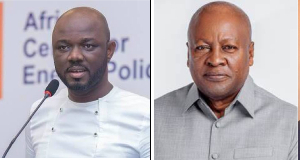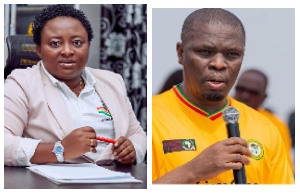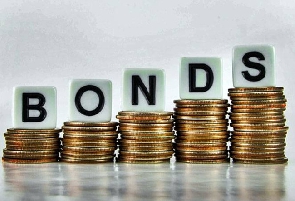The Executive Director of the Africa Center for Energy Policy (ACEP), Ben Kwabena Boakye, has called on President John Dramani Mahama, to prioritize an investigation into the Mineral Income Investment Fund (MIIF), the parent company of Agyapa Royalties Limited, which has been plagued by financial malpractices.
Ben Boakye, urged President Mahama, not to disappoint the nation by allowing the alleged financial mismanagement at MIIF to go unchecked.
According to Mr Boakye, “Civil society organizations (CSOs) that fought against the Agyapa deal expect that the John Dramani Mahama (JDM) government will reverse this unfortunate situation and free up cash for development”.
His admonishment came in the wake of The Herald’s revelation about the financial mismanagement that has gone on at MIIF, leading to the loss of millions of dollars in multiple deals, including Gold for forex deals, senseless procurements, the purchases of equity, corporate social responsibility, among others.
In a post on X (formerly Twitter) yesterday, the ACEP boss, remarked, “As we examine the books of MIIF, the nation would be left wondering if this was/is a sovereign wealth fund or financial banditry with zero risk appetite hitherto possible in sci-fi movies”, adding the blessings of natural resources must be spent to improve lives — love your people”.
He cited how the ex-Finance Minister in the Akufo-Addo administration, Ken Ofori-Atta, reduced any disagreement to ideological opposition, showing his determination to push the plan forward regardless of the objections.
Boakye argued that, “The current situation—where ineffective funds divert resources from the national budget for discretionary abuse by agencies—entrenches inequality and ignores the fundamental challenges facing the country: poor water supply, inadequate schools, a struggling healthcare system, while MIIF remains rich and reckless”.
Referencing the Agyapa deal, he mentioned that, “since the programme was aborted, Ghana has received $1.08 billion in royalties, of which 80% ($865.5 million) would have been tied up in the Agyapa deal in just four years and the rest of Ghana’s gold royalties in perpetuity. This starkly illustrates the poor judgment that went into the decision to sell Ghana’s gold royalties.
Boakye highlighted past recommendations to improve the governance and efficiency of MIIF. These included: Merging MIIF and GIIF: A proposal to combine MIIF with the Ghana Infrastructure Investment Fund (GIIF) to create a more streamlined and purposeful development fund.
Introducing a cap on total allocations to MIIF/GIIF at a maximum amount (e.g., $5 billion), after which all royalties would revert to the national budget. This would treat allocations to the funds as equity of the state.
Boakye, concluded by emphasizing the urgent need for reform and accountability, stating that Ghana’s natural resources, must be leveraged to benefit the people, rather than perpetuate inequality and mismanagement.
Below is the full statement by Ben Boakye on X titled “Why President Mahama Should Not Disappoint on MIIF”.
1. The Mineral Income Investment Fund (MIIF) was created to facilitate the Agyapa Royalty Investments—a concept masterminded by Ken Ofori-Atta and Adu Boahen to sell Ghana’s gold royalties on the London Stock Exchange.
2. At the time the MIIF Act was passed, Parliament was unaware of the true intentions behind it—the Agyapa transaction. However, the sponsors and their numerous allies, including lawyers and financial engineers, knew exactly what they were doing: valuing Ghana’s royalties from the 48 most promising mining concessions at $1 billion and offloading 51% of that value on the stock market for around $500 million.
3. We wrote a paper to highlight the distinctiveness of state royalties, arguing that it was unconscionable to treat them like any royalty streaming business. We also pointed out the flaws in assuming definite numbers for mineral deposits, including those still under exploration—the fact that the investor position and the state position are different in natural resource valuation; Investors have time limits to mineral deposits and states maintain perpetual ownership.
4. Mr. Ofori-Atta reduced any disagreement to ideological opposition, showing his determination to push the plan forward regardless of the objections.
5. Thankfully, Ghanaians united to resist the implementation of the Agyapa transaction— perhaps saved by the election bells in 2020.
6. Since the programme was aborted, Ghana has received $1.08 billion in royalties, of which 80% ($865.5 million) would have been tied up in the Agyapa deal in just four years and the rest of Ghana’s gold royalties in perpetuity. This starkly illustrates the poor judgment that went into the decision to sell Ghana’s gold royalties.
7. With Agyapa aborted, MIIF, the father of Agyapa, maintained control over the resources for its investment rather than direct development expenditure of that critical share of Ghana’s gold resources.
8. The royalties paid by gold-producing companies are now declared as revenue for MIIF—no effort is required. MIIF’s executives are free to hold press conferences to tout their “stellar” performance when the direct efforts of gold
producers generate the royalties.
9. While the government decimated the investments of citizens and external creditors through haircuts, MIIF remains a wealthy entity with billions of cedis in cash reserves. It funds school reunions, political events, the construction of astroturfs, politically connected small-scale mining operations, and various other investments, besides the huge administrative overheads.
10. Civil society organizations (CSOs) that fought against the Agyapa deal expect that the John Dramani Mahama (JDM) government will reverse this unfortunate situation and free up cash for development.
11. Prior to recent appointments at MIIF, some compromises were suggested by leading figures in the ruling government: one, a merger of MIIF and the Ghana Infrastructure Investment Fund (GIIF) to streamline the funds and create a more purposeful development fund; and two, capping the total allocation to MIIF/GIIF at a maximum amount (e.g., $5 billion), after which all royalties would revert to the national budget. In essence, to treat allocation to the funds as equity of the state.
12. The current situation—where ineffective funds divert resources from the national budget for discretionary abuse by agencies—entrenches inequality and ignores the fundamental challenges facing the country: poor water supply, inadequate schools, a struggling healthcare system, while MIIF remains rich and reckless.
13. As we examine the books of MIIF, the nation would be left wondering if this was/is a sovereign wealth fund or financial banditry with zero risk appetite hitherto possible in sci-fi movies.
Meanwhile, watch as NDC supporters vandalise Ho Central office over government appointment
Politics of Friday, 24 January 2025
Source: theheraldghana.com

















